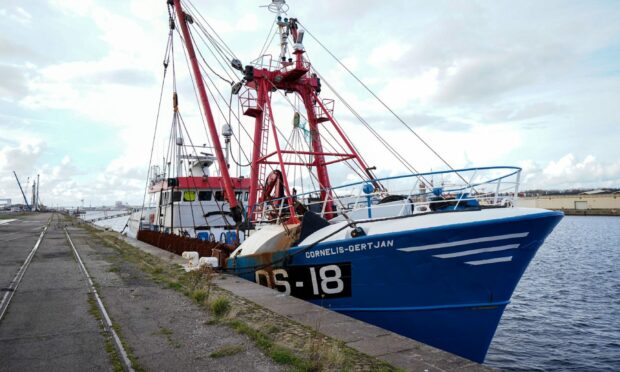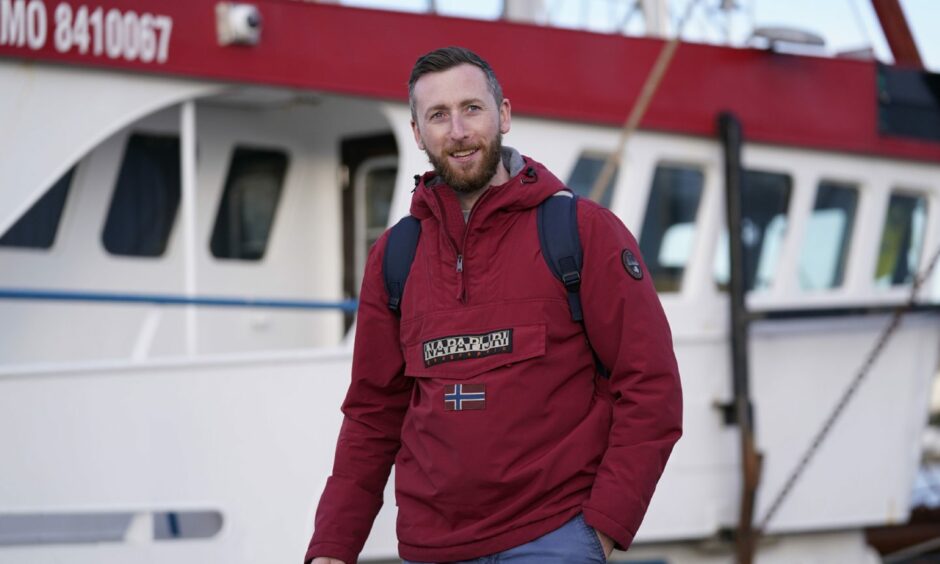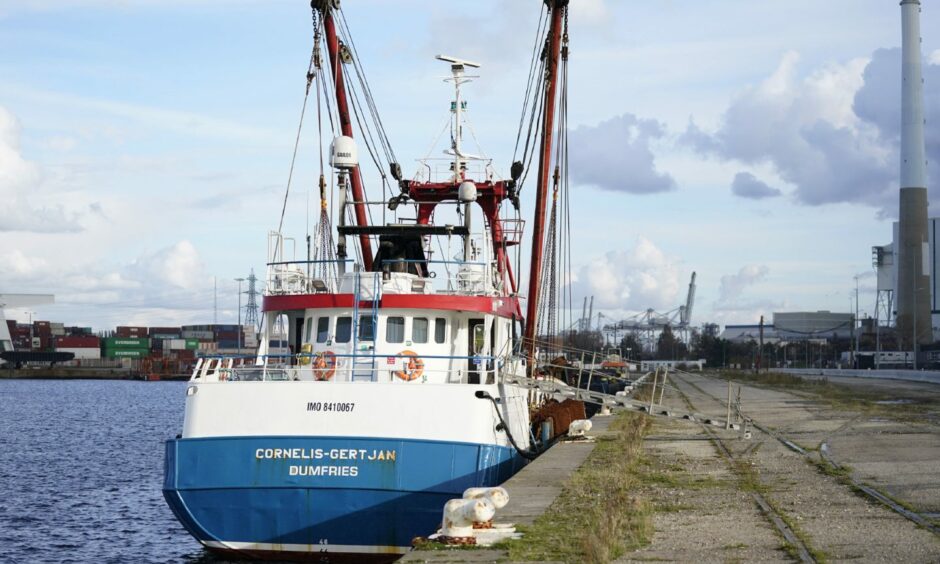The Macduff Shellfish trawler Cornelis Gert Jan that was impounded by France amid the post-Brexit fishing row has been released by the French authorities and is setting sail from Le Havre.
The Scottish-registered scallop dredger left the northern French port on Wednesday evening after being held there since last week, when France accused it of fishing in its waters without a proper licence.
Video showed the blue, white and red trawler departing the quayside after dusk.
The public affairs director of the vessel’s owner Macduff Shellfish confirmed it has been released by French authorities.
“The court (of appeal) determined that no bond was required for the release of the vessel,” Andrew Brown said in a statement to the PA news agency.
He added: “We are pleased to have this matter resolved and delighted that our crew and vessel are now able to return home. The crew have acted with calmness and professionalism throughout the entire incident.
We’re clearly caught in a political game as there is a whole story spun around this entire case, whereas in fact it is a rather mundane affair over fishing in an area that is supposedly out of bounds.”
Lawyer, Mathieu Croix
“They are in good spirits, looking forward to return to their loved ones and are grateful for all the messages of support received from the British public.”
The ruling came after the Macduff Shellfish trawler captain, Jondy Ward, appeared at the Court of Appeal in Rouen earlier on Wednesday.
“If it goes right we’ll get out of here today,” the Irish skipper told reporters after the hearing.
Trawler skipper insists ‘everything was legal’
Mr Ward explained that French maritime police detained the trawler last week for not being on a European register when it was fishing off the Normandy coast.
The skipper of the Macduff Shellfish trawler said he did not know if it was an error on the part of UK or French officials.
“We had everything in order on the bridge, as far as I was concerned we had everything in place to be legal,” he said.
He said the boat was “definitely” caught in the middle of the Franco-British spat over post-Brexit fishing arrangements.
The comments were echoed by his lawyer, Mathieu Croix, who told reporters outside the courtroom: “We’re clearly caught in a political game as there is a whole story spun around this entire case, whereas in fact it is a rather mundane affair over fishing in an area that is supposedly out of bounds, and about licences that may or may not have been given and catch amounts that are relatively modest.
“From then on, given the current political climate, the case blew up to levels that in our view are totally disproportionate.”
UK-France political spat continues
The produce that France says the Cornelis Gert Jan caught illegally in its waters was seized by French maritime police, according to Mr Croix.
Mr Ward faces trial next August regardless of Wednesday’s ruling, but the charges could be dropped before then.
At the centre of the post-Brexit fishing dispute are the licences for small French boats, which are issued only if the vessels can demonstrate a history of fishing in British waters.
French President Emmanuel Macron had warned that Paris could block British boats from landing their catches in French ports and tighten customs checks in protest against what is claimed is a refusal by the UK authorities to grant licences to French boats.
However, France suspended the threats at the 11th hour as negotiations continued, a move welcomed by Britain.
On Wednesday, Downing Street acknowledged France could reimpose its threats in the fishing row as Brexit minister Lord Frost prepares to hold talks with France’s Europe minister Clement Beaune.
The Prime Minister’s official spokesman said: “He will be discussing both the (Northern Ireland) protocol and the fisheries issues, we want to emphasise that our position as regards to how we grant licences has not changed in any way.
“But we are keen to discuss the broader issue of the protocol and come up with substantive changes.
“It’s entirely up to the French government if they want to reimpose the threats that we saw they both announced and stood back from in recent days.”
Asked what success in Thursday’s meeting in Paris looks like, the spokesman said: “We’re seeking substantive changes to the protocol with the EU and these changes are necessary because the protocol as it is being enforced is extremely challenging.
“So, we want to seek agreement from the EU that they will make the changes necessary so that it can be sustainable in the long term.”
Meanwhile, talks organised by the European Commission to find a solution to the dispute have led to a “better understanding of the outstanding issues”, a commission spokesman has said.
Speaking at a press briefing on Wednesday, the spokesman said officials from the UK, France, Jersey and the European Commission have been meeting for the past two days.
He said: “These talks have allowed us to chart the way forward on several aspects and have created a positive dynamic aiming at a solution. The technical meetings will continue today, including also with some officials from Guernsey.
“The talks in these past few days have allowed for a better understanding of the outstanding issues which have been impeding quicker progress, and we hope that the positive engagement on all sides will soon translate into concrete results.”


